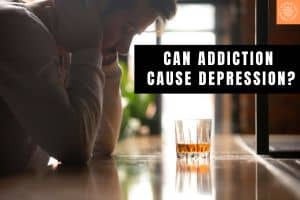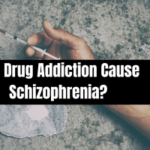Can substance abuse cause depression and anxiety? Well here’s the answer…
Anxiety, Depression and Substance Abuse are complex and interrelated issues that can have a significant impact on an individual’s life.
While addiction can cause a range of physical and psychological problems, depression is a common co-occurring condition that can exacerbate the negative effects of addiction.
In this response, we will explore the link between Depression and Substance Abuse, and discuss how Addiction Causes Depression.
But Why Does Addiction Cause Depression?
Well it happens because when someone is struggling with addiction, their substance or behavior of choice can become a coping mechanism for dealing with difficult emotions or stressful situations.
However, the temporary relief provided by addiction can ultimately lead to a worsening of those underlying issues, including depression.
Repeated use of addictive substances or behaviors can alter the brain’s chemistry and make it more difficult for the individual to experience pleasure or satisfaction from other sources, which can contribute to feelings of depression and despair.
Furthermore, the negative consequences that often accompany addiction, such as financial troubles, strained relationships, or legal problems, can also contribute to feelings of hopelessness and despair, which can further exacerbate depression.
Thus if you are looking for ways or want to help your loved ones on ; How to Overcome Addiction and Depression get an free consultation with Sumiwar Nasha Mukti Kendra providing best Drug Addiction Treatment in Patna.
And for now let us further dive into this blog and know about How Does Addiction Cause Depression and its symptoms.
How Does Drugs and Alcohol Cause Depression?
Depression after Drug Addiction is a common mental health issue whether it be to drugs, alcohol, or other substances, being a contributing factor to the development of depression.
Here are some symptoms of depression that may be caused by addiction:
#1. Feelings of Hopelessness or Helplessness
Addiction can lead to a sense of despair and hopelessness, which can contribute to feelings of depression. When a person feels that they cannot control their substance use, they may feel that there is no hope for recovery.
#2. Loss of Interest in Activities
A person who is addicted to drugs or alcohol may lose interest in activities that they once enjoyed. This can be due to the fact that the substance use has become their primary focus, leaving little room for other activities.
#3. Sleep Disturbances
Addiction can disrupt sleep patterns, which can contribute to feelings of depression. People who are addicted to substances may have trouble falling asleep, staying asleep, or getting restful sleep.
#4. Changes in Appetite
Addiction can affect appetite, leading to either an increase or decrease in food intake. This can contribute to changes in weight, which can further contribute to feelings of depression.
#5. Fatigue or Lack of Energy
Substance use can drain a person’s energy, leaving them feeling fatigued and unmotivated. This can contribute to feelings of depression, as a lack of energy can make it difficult to engage in activities that are important for mental health.
#6. Feelings of Guilt or Shame:
Addiction can lead to feelings of guilt or shame, which can contribute to depression. A person may feel guilty for their substance use or ashamed of their behavior while under the influence.
#7. Suicidal Thoughts or Behaviors
Addiction can increase the risk of suicidal thoughts or behaviors. If a person is struggling with addiction and depression, they may feel that there is no hope for recovery and that suicide is the only way out.
It’s important to note that addiction and depression are complex issues that require professional treatment.
If you or someone you know is struggling with addiction and depression, it’s important to seek help from a mental health professional or addiction specialist.
You must also read How Exercise Helps in Addiction Recovery and more.
On the basis of these above addiction symptoms causing depression it will more easy for you people to identify the types of depression.
Types of Depression Due to Addiction
Addiction can cause or worsen depression, and there are several types of depression that can occur in individuals struggling with addiction.
Here are some of the most common types of depression that can be associated with addiction:
#1. Substance-Induced Depression
This type of depression can occur as a result of using drugs or alcohol. Substance use can alter brain chemistry and lead to feelings of sadness, hopelessness, and lethargy.
#2. Withdrawal-Related Depression
When someone tries to stop using a drug or alcohol, they can experience withdrawal symptoms that can include depression. These symptoms can last for a few days to several weeks, depending on the severity of the addiction.
#3. Dual Diagnosis Depression
Dual diagnosis is a term used to describe someone who has both a substance use disorder and a mental health disorder. Depression is a common co-occurring disorder with addiction.
#4. Post-acute withdrawal syndrome (PAWS) Depression
PAWS is a set of symptoms that can occur after someone has stopped using a drug or alcohol. These symptoms can include depression, anxiety, and irritability, and can last for months after someone has stopped using.
It’s important to note that treating depression in the context of addiction requires a holistic approach that addresses both the addiction and the depression.
A qualified mental health professional or addiction specialist can help develop an appropriate treatment plan.
Treatment Option for Addiction Causing Depression
Treatment for addiction causing depression typically involves a combination of medication, therapy, and lifestyle changes. Here are some options:
#1. Medication
There are several medications that can be used to treat depression and addiction, including antidepressants, mood stabilizers, and anti-anxiety medications.
Your healthcare provider can help determine which medication(s) are appropriate for you.
#2. Therapy
Cognitive-behavioral therapy (CBT) and other types of talk therapy can be helpful in treating addiction and depression.
These therapies can help you identify negative patterns of thought and behavior, develop coping skills, and improve your overall mental health.
#3. Support Groups
Joining a support group, such as Alcoholics Anonymous or Narcotics Anonymous, can provide you with a sense of community and support.
Being able to connect with others who are going through similar experiences can be incredibly helpful.
#4. Lifestyle Changes
Making positive lifestyle changes, such as exercising regularly, eating a healthy diet, and getting enough sleep, can help improve your mood and overall health.
#5. Dual Diagnosis Treatment
If you have both addiction and depression, it may be helpful to seek treatment at a facility that specializes in dual diagnosis. These facilities can provide specialized care for both conditions simultaneously.
It’s important to remember that treatment for addiction causing depression is not one-size-fits-all.
Your healthcare provider can work with you to create a personalized treatment plan that takes into account your unique needs and circumstances.
How to Help Someone with Drug Addiction and Depression?
In conclusion, addiction can cause depression due to the impact it has on the brain and the overall well-being of an individual.
It’s important to note that not all cases of addiction lead to depression, and not all cases of depression are caused by addiction.
However, if you or someone you know is struggling with addiction and experiencing symptoms of depression, get in touch with Best De-Addiction Centre in Patna.
The cycle of Addiction to Depression sometimes causes due to the feelings of guilt, shame, and hopelessness.
Seeking professional help and support is crucial for individuals struggling with addiction and depression to manage and overcome these conditions.
With this we recommend you to surely follow the above tips to get rid of such addictions or substance abuse.



